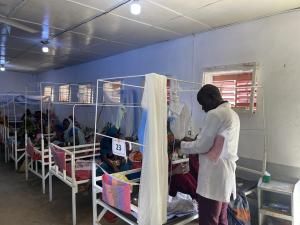Stepping up emergency health assistance in Chad as conflict in Sudan rages
Abéché, Chad – Lying in a hospital bed, Idriss Yahya Annour, who recently fled the conflict in Sudan to neighbouring Chad, recalls how the vehicle they were escaping in came under fire in an attack that left him with a bullet wound and a fractured femur.
After days of trekking with his family to seek safety, they finally crossed the border into Chad where he was evacuated for treatment at a hospital in Abeche in eastern Chad where many of those fleeing the conflict have settled.
“I was operated on a fortnight ago. Soon I'll be able to go and re-join my family, (who are staying) two days' drive from here,” says Annour. World Health Organization (WHO) has deployed surgeons in the Abeche hospital to treat trauma cases.
With support from WHO and partners, more than 2300 people with trauma and war-related injuries have been identified and provided treatment in Chad’s eastern Ouaddai province where most of the over 300 000 people who have fled Sudan are now living but facing difficult conditions in makeshift settlements that are heightening their vulnerability to diseases and other threats. The rising health needs are exerting further pressure on already weak health system in the country’s east.
Dr Sena Amouzou, a plastic surgeon and a member of Togo's WHO-trained emergency medical team who arrived in Abeche at the end of June, says that when they were contacted to deploy to Chad “we said yes straight away.” Accompanied by a vascular surgeon and a nurse specializing in the treatment of burns and wounds, the team operated on nearly 60 patients in just three weeks, including those with gunshot wounds. The surgeons are also mentoring colleagues at the Abeche Hospital.
"We are assisting our Chadian colleagues to treat the wounded quickly, to ensure that there is always room for (new) patients who arrive,” Dr Amouzou explains, stopping to talk in a hospital corridor. “
But by the time many of these wounded arrive, infection has already set in, which lengthens their hospital stay. By working to ease the workload, we’re helping the hospital’s overloaded staff to concentrate on other critical tasks.”
WHO has also equipped the hospital with a technical facility to care for people requiring emergency surgery, as well as an operating theatre.
“Chad has received trauma kits to treat up to 5000 people for three months thanks to WHO,” said Dr Abdelmadjid Abderahim, Chad's Minister of Public Health and Prevention when he visited the Abeche hospital recently, pointing out that country urgently needs to recruit at least 2500 health workers to meet the increased needs.
Since the arrival of the first refugees in Chad, WHO has shipped about 36 tons of medical equipment and medicines, sent from its new health emergencies hub in Nairobi, Kenya. Along with surgical interventions, these supplies have allowed for the treatment of a range of diseases, including malaria, diarrhoea and acute respiratory infections amongst the refugees and returnees. In addition, more than 51 000 children at 34 refugee reception sites have been vaccinated against polio.
During the early weeks of the conflict, WHO sent seven tons of first aid kits to partners Médecins Sans Frontières and the International Committee of the Red Cross, which set up field hospitals n Andre and Frachana localities in eastern Chad. A total of eight emergency health experts have also been deployed to support logistical operations, coordinate health assistance and strengthen disease surveillance, with plans to deploy three more in the coming weeks.
Meanwhile, WHO is collaborating with Chad's health authorities to strengthen pharmaceutical storage capacity in Abéché and the country capital N'Djamena.
The support will remain ongoing, amidst estimates that a further 200 000 people could cross the border from Sudan by the end of the year, says Dr Jean-Bosco Ndihokubwayo, WHO Representative in Chad.
“WHO will continue to support the Chadian authorities to meet the urgent health needs of refugee populations, and to ensure that the country has the capacity to cope with the ongoing influx of people,” says Dr Ndihokubwayo.
